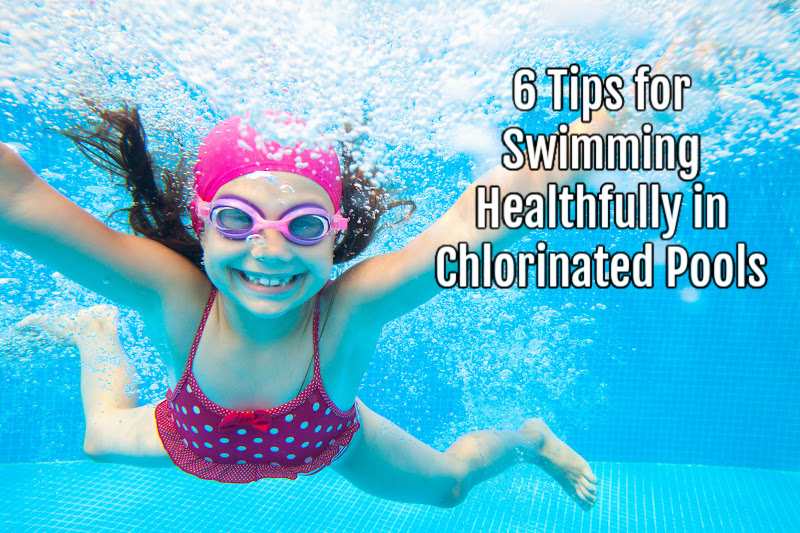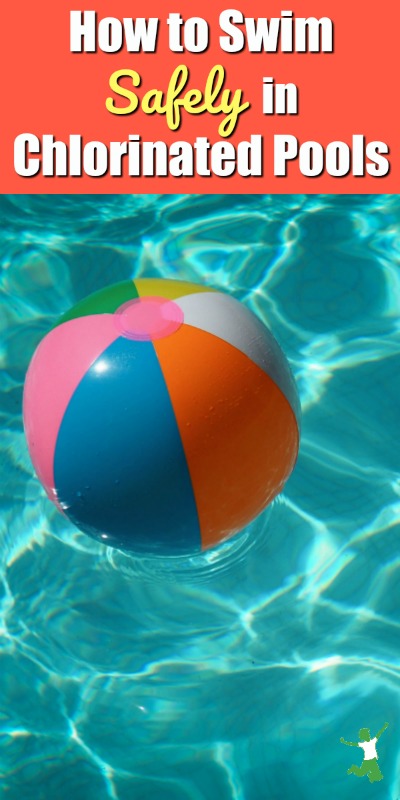The reasons why swimming in chlorinated pools is dangerous to health and the 6 steps to take to protect yourself and your family while still enjoying water fun all summer long.

The reasons why swimming in chlorinated pools is dangerous to health and the 6 steps to take to protect yourself and your family while still enjoying water fun all summer long.
An important topic to explore as we head into the summer season is chlorinated pools.
Chlorine is popular because it handles the three main jobs in keeping a swimming pool clean: It sanitizes (kills bacteria and germs), oxidizes (controls organic debris from perspiration and body oils), and deters algae. The chemical is unpopular, however, because it has a strong odor, reddens eyes, causes allergic reactions in some swimmers, and is a known carcinogen – meaning it has been linked to cancer!
Chlorine absorbs into your skin. Too much exposure to chlorine has been linked to major health problems including reproductive disorders and even birth defects. It can cause your skin and hair to dry out and over time too much exposure can even cause wrinkles.
Editor’s Note: Have you ever wondered why Olympic swimmers seem to have so many wrinkles at such young ages and most of the men start losing their hair so quickly? Could it, in fact, be caused by overexposure to chlorine for so many years and so many hours every day? Perhaps so.
When chlorinated pools are indoors, toxic gases such as nitrogen trichloride are released, which can be very dangerous. When we breathe in this gas it can cause severe damage to the lining of the lungs which could lead to respiratory problems or asthma. This toxic gas can be harmful at any age yet it poses the most risk to elderly people and small children.
So while chlorine used to disinfect swimming pools is widely recognized as a health hazard, not everyone has access to the ocean or a lake, or pools treated with ozone, ionizers, bromine, silver-cooper, or other alternatives which can frequently be much more expensive.
6 Tips to Protect Health in Swimming Pools
If you or your family members do choose to swim in chlorinated pools, some recommendations I’ve read are to:
1. Swim in outdoor chlorinated pools only if at all possible. It is much safer because the toxic gases are mostly eliminated in the open air.
2. Swim in chlorinated pools occasionally. It is regular exposure to chlorinated pools that presents the greatest risk to health.
3. Shower immediately before and after using a natural Castile soap.
4. Drink plenty of home-filtered water (better than bottled!) beforehand so that you are well hydrated.
5. Consider wearing a mask and snorkel to shield your eyes – and even a wetsuit, if you are willing to go that far!
6. Get fresh air afterward so you don’t continue to inhale the fumes, and can clear your lungs.
Why shower immediately before swimming in a chlorinated pool?
Julie Deardorff explains in her article published in the Chicago Tribute, “Another important reason to shower is that our bodies generally contain residue from consumer products, including perfume, make-up, body lotion, shampoo, and sunscreen.
When the chemicals used to disinfect the pool mix with organic matter (sweat, hair, urine) or nitrogen-rich substances (commonly found in consumer products) it can create a more toxic agent, said Michael Plewa, a professor of genetics at the University of Illinois whose new research has linked pool chemicals to health problems, including asthma and bladder cancer.”
Red, burning, itchy eyes and skin?
What I’ve read is that the presence of chloramines can cause reactions such as red, burning, irritated eyes: Chloramines form when chlorine reacts with ammonia. Ammonia enters the pool through sweat and urine. It is important to teach children not to urinate in pool water [even though it is chlorinated].
Also, showering before swimming can remove excess sweat that interacts with chlorine. My understanding is that if the sweat is on your skin, and hasn’t been rinsed off first in the shower, the chlorine will interact with the sweat on your skin as you enter the pool, and may result in some folks getting itchy skin.
So, what do you think? Do the benefits and joy of swimming and playing in a pool outweigh the health risks of chlorine?

Additional articles on this topic
The Dangers of Chlorine
Asthma In Swimmers
Swimming Pools May Increase Cancer Risk
The Hidden Danger of Swimming Pools
Swimming Pool Alternatives to Chlorine
Water Birth Dangers








as a holistic hairdresser and real food advocate I liken swimming in chlorine pools (for exercise) to jogging along a major highway. However a refreshing summer swim is part of the summer season for many children and adults. Chlorine is very alkaline and so are soaps and detergents – which is why you can still smell like chlorine after soaping up. What changes this is a dilute vinegar rinse (which has acidicPH and healing). You can mix 1/2 good apple cider vinegar to 1/2 water. Pour this mixture thru your hair and over your skin. You can also put it in a spray bottle (don’t let the solution sit in plastic though). Or a cup of vinegar in the bath. Let sit on the skin for a few minutes then rinse off. This can be done after a thorough soaping if you wish. Vinegar also heals sunburn overnight. Good organic vinegars like Braggs work better than cheap supermarket vinegars.
Candice, I really like these recommendations and will incorporate them in any future iterations of this post!
Just wanted to add that chlorine, like bromine, gets absorbed by iodine receptors, thereby blocking full absorption of iodine. So if you swim in pools a lot, you will need to greatly up your iodine intake.
Also, if you are already getting adequate amounts of iodine, less chlorine will be absorbed.
Excellent point, April – I will pass it along!
Yes! Thank you for this!!
Including what we can do when we do swim in clorinated pools is VERY helpful! We don’t all have access to a salt water pool : )
I spent years training at an indoor pool. I am now allergic to chlorine, and I was sick most of the year, back then.
Hi, I just wanted to share my experience. We inherited an above ground pool when we moved to our new home. Last year I bought the USA-made Floatron (available on their website or Amazon) for less than $300. It is solar powered copper ionizer and it works fantastic!! We balance the pool in the spring with chemicals, but then the Floatron is perfectly capable (even in cloudy Michigan!) of keeping the pool crystal clear all summer long with only the barest minimum of chlorine tablets used occasionally. It feels like swimming in rain water, with no nasty smells or irritation of my skin or that of my young children. I highly recommend this product.
Thanks, Heidi – I will refer folks to this recommendation. We are discussing this on our Facebook page!
I have also heard from my chiropractor and other sources that chlorinated water kills some of your beneficial gut bacteria. We swim in the river whenever possible but when my kids occasionally go to a pool party I give them some extra probiotics that day.
Good point, Tracey – I wish I had added that to the post!
Hi Sandrine,
Thank you for your post. Once again a hard dilemma for a parent! It’s almost impossible to keep my kids completely out of the pool this time of the year, though… Can you suggest a good shower filter? I believe our water has chlorine and it would be good to at least shower the kids with non chlorinated water after the pool.
Thanks,
Paula
Radiant Life offers water filters for the sink, shower and whole house. I have the 14 stage water filtration system and have recommended it for years. Radiant Life is offering a promotion to those in the Nourishing Our Children community: Please use code NRC at “My Shopping Cart” to have Radiant Life make a donation of 10% of your total order to Nourishing Our Children. You will automatically be entered into our quarterly giveaway of a $25 gift certificate.
These are the shower filters: http://www.radiantlifecatalog.com/product/SHOWER-FILTER-CHLORINE/water-filtration-systems
http://www.radiantlifecatalog.com/product/NEW-CENTURY-SHOWER-FILTER-CHLORINE/water-filtration-systems
For the bath: http://www.radiantlifecatalog.com/product/CRYSTAL-BATH-BALL-DECHLORINATOR/water-filtration-systems
Ensure that your water has chlorine in it – some cities, like San Francisco, use chloramine and the filters are intended for chlorine.
Paula,
Since I supplied several links, my reply awaits moderation. Sarah may not have access to the internet in order to approve in a timely manner. You may write to me directly for my response! blog at nourishingourchildren dot org.
I have known about these dangers for many years now and will not swim in a chlorinated pool. However as I am writing this my 10 year old grandson is at swim lessons at our high school . I can’t go to watch any swim meets or anything because being in that closed environment makes me really very sick. But there is nothing we can do about it .:(
In order for the shower before swimming to be effective wouldn’t it have to be in unchlorinated water? I would venture to guess that most pool showers don’t have chlorine filters on them.
Yes – I concur. I think it wise to shower at home, if you have a chlorine filter there!
No. The idea is to remove nitrogen bearing compounds from your flesh and swimsuit.
LOL – we need an article to tell us chlorine smells bad and gives us red, irritated eyes? If people don’t know that it’s unlikely they have access to a pool! Guess this may be helpful to the competitive swimmers (who likely also already know this) but how many are reading this blog? Please.
Why do we keep doing it then?
And a lot of my own family don’t know the dangers of doing this . Maybe this will help someone that dont know.
Wow! Let’s use our manners in replying here! This info is helpful to some and maybe common knowledge to others. That chlorine is stinky and irritates our eyes was obviously not the only information given in this post.
And in response to some of the earlier replies, just because you or someone you know swam for years and suffered no ill effects does not negate the fact that chlorine is bad for you. It is simply good to be aware and take precautionary measures when and where you can.
Hi Melinda,
We are having a concurrent Facebook discussion on our Nourishing Our Children page and there are those who are not aware of this information. In fact, we routinely have people who are discovering information I present for the first time that is very well known to others. So, I don’t take any information for granted.
Just in time…I want to do swimming lessons…